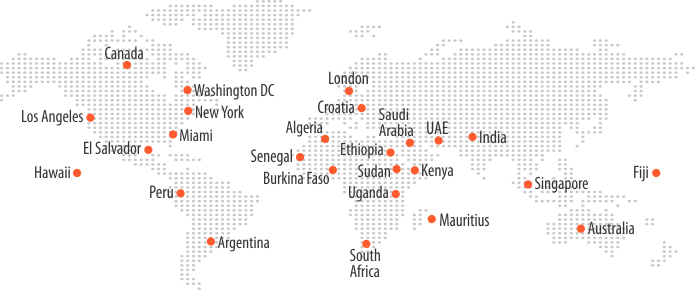10 Surprising VoIP Benefits You May Not Know About

The VoIP services industry shows no sign of slowing down as it continues to strengthen, with businesses moving to cloud communication because of technological advances. Apart from the advanced capabilities and convenience offered by VoIP service providers, the pandemic’s big push towards remote and hybrid work arrangements has contributed significantly to the growth of the mobile VoIP industry.
Today’s VoIP system includes more functionalities than just wholesale/retail voice calling and Interactive Voice Response (IVR). Whatever your niche, VoIP technology provides a reliable, efficient, and unified platform for business communication through intelligent call routing strategies, integrations, omnichannel presence, better organization of conversations, and more.
According to a recent study, automated customer service has secured its position amongst top AI investments, with funding worth $4.5 billion, followed by sales process automation ($2.7 billion) and threat prevention ($2.7 billion). Telecommunication is closely concerned with customer service, sales, and security, and VoIP systems strive to bring quality, profitability, efficiency, and innovations to these areas.
Let’s discover some lesser-known advantages of VoIP services leading innovation in business communication.
Discover 10 Advantages of VoIP Systems You Might Not Have Known
Amplified Productivity
VoIP services providers offer cloud-hosted platforms that make a foundation for intelligent capabilities that analog phone lines could never achieve. Unified communication is one such approach that accounts for the most significant productivity gains. It erases boundaries between the desk phone and the mobile phone, the team collaboration and the customer interface tool.
Advanced features like intelligent routing, automated IVR, voicemail, and virtual phone numbers ensure that employees or agents never miss calls. Besides, with customer data handy, employees can focus on clients’ in-the-moment needs rather than launching a lengthy investigation into previous conversations.
Rich Conversations Using Machine Learning
VoIP services providers are looking into opportunities to enrich conversations by applying machine learning (ML) and Natural Language Processing (NLP) to voice during and after calls. The VoIP system can process and leverage call data to predict callers’ intentions and route them to a particular employee or team.
During the call, AI and ML can offer suggestions on how agents can proceed to make customers happy based on the emotional weight of each sentence. It can also translate the call in real-time for call centers in different countries. Post-conversation, VoIP APIs (Application Programming Interfaces) can aggregate insights and take actions, such as scheduling follow-ups, booking appointments, etc.
Have Complete Control Using Effective Dashboard Design
VoIP systems often come with comprehensive dashboards and admin portals with an effective user interface that keeps all VoIP functionalities a click away. This portal allows the business to build a call flow or a call tree, e.g. when the company receives a call from a new customer who has placed an order, it should be directed to the sales team through auto-attendant.
Users can set up their profiles with customized voicemails, pop-up guides, tasks, projects, and more. VoIP dashboards give access to easy-to-use communication analytics, after-call surveys, sales automation, inbox, and more.
Easily Scalable Tech Stack
Scalable technology is one of the prime reasons businesses switch to VoIP services because it can be modified when needed. It enables enterprises to manage frequent and sizable changes in campaigns. For instance, contact centers will be flooded with customer inquiries when a brand launches a campaign to bring a new product to the market. The business can easily add extra phone lines and even spin up unique virtual phone numbers for callers.
When the campaign ends, seasonal spikes die down, or a business experience a lull, they can scale back down their VoIP phone network. VoIP expansion and alterations are affordable and effortless.
Workforce Optimization through Omnichannel Model
The flexibility of VoIP systems enabled by API Integrations allows businesses to implement an omnichannel strategy. A unified and well-connected view of multiple communication channels makes it easy for employees to help customers. In an omnichannel strategy, customer data from an offline branch, website, mobile app, social, and phone calls are all synced in real-time to display previous interactions, notes, and context to the agents.
Businesses can benefit from the following using omnichannel VoIP features:
- Increased customer retention rates
- Faster query resolution times
- Optimized remote workforce
- Enhanced personalization
Complete Portability
VoIP facilitates complete portability, which is beneficial, especially for remote, hybrid, and highly mobile teams requiring frequent travel. Users can access their VoIP phone systems from anywhere with a working internet connection.
Besides the softphone interface, VoIP service providers offer iOS or Android apps and web-based calling. Hence, employees are always in contact with customers whenever they are away from their desks.
Today’s VoIP systems help meet the demands of remote and on-the-go workforce with collaboration features like instant messaging, file sharing, co-editing, video conferencing, and white-boarding tools.
Increased Security
Security threats are rising, where bad actors find an entry point into the VoIP system through fraudulent phone calls. VoIP is among the biggest targets for DDoS attacks and social engineering. However, in recent years, VoIP has witnessed the development of higher levels of encryption, tailored security packages, and comprehensive firewalls.
VoIP providers update their architecture consistently to help mitigate security breaches through newer vulnerabilities. They also offer remote network monitoring, real-time security alerts, and access control to track and stop questionable calling behavior.
Superior Voice Quality
VoIP can deliver higher quality and reliable phone service thanks to advances such as HD voice, global points of presence, automated bandwidth adjustments, and partnerships with tier-1 carriers. Unlike VoIP in its earlier days, VoIP calls are likely to be crisp and clear with no latency, jitter, lags, or call dropouts. VoIP technology consistently delivers high-quality calls with an SLA-guaranteed uptime of almost 99.9%.
Direct and Indirect Cost Savings
With traditional phone lines, businesses incur massive upfront costs related to PBX (Private Branch Exchange) hardware and copper wiring charges. VoIP networks don’t need these since broadband connections power VoIP services. VoIP calls are cheaper than calls over Public Switched Telephone Network (PSTN) or the traditional circuit-switched telephone network.
It facilitates competitive charges for long-distance or international calling due to wholesale voice carrier arrangements. The indirect cost savings include savings with remote work and repurposed human resources. VoIP systems also come with add-on features that are not inherent in other methods, such as call forwarding, group ringing, call flow, direct inward dialing, and more.
Improved Sales and Customer Support through Integration
VoIP is a cloud-based phone system that offers out-of-the-box integrations with help desk software, sales tools, CRM, email marketing tools, transcription apps, and more. Employees can access, use, and share data from these integrations to multitask and derive optimum results. It consolidates communications from emails, CRM, calls, social media, and surveys into an intuitive, single point-of-view.
For instance, sales app integrations work with CRM to centralize workflows, enabling businesses to track and monitor sales through call analysis. Similarly, customer support integrations allow companies to aggregate data from events, calls, CRM, and email marketing to measure customer satisfaction and agent performance metrics.
Answer the Call of Your Business Communications Needs
VoIP services providers are joining forces with modern and advanced information and communications technology infrastructure. They offer flexible and scalable VoIP services that help unleash unified and streamlined business communication. VoIP solutions help businesses meet customer expectations, empower employees to be more productive, and deliver rich, personalized experiences.
Bankai Group has exclusive traffic arrangements with MNOs, MVNOs, and enterprise customers to provide high-quality A-Z, retail, and wholesale VoIP services.
Related Posts
Decoding the Myths of VoIP Call Quality
The Next Big Thing in VoIP: Artificial Intelligence Integration






